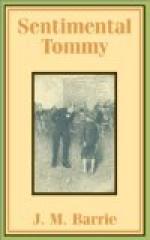One cruel revenge the beaten rivals had. They waylaid Grizel, when she was alone, and thus assailed her, she answering not a word.
“What’s a father?”
“She’ll soon no have a mither either!”
“The Painted Lady needs to paint her cheeks no longer!”
“Na, the red spots comes themsels now.”
“Have you heard her hoasting?”
“Ay, it’s the hoast o’ a dying woman.”
“The joiner heard it, and gave her a look, measuring her wi’ his eye for the coffin. ‘Five and a half by one and a half would hold her snod,’ he says to himsel’.”
“Ronny-On’s auld wife heard it, and says she, ’Dinna think, my leddy, as you’ll be buried in consecrated ground.’”
“Na, a’body kens she’ll just be hauled at the end o’ a rope to the hole where the witches was shooled in.”
“Wi’ a paling spar through her, to keep her down on the day o’ judgment.”
Well, well, these children became men and women in time, one of them even a bit of a hero, though he never knew it.
Are you angry with them? If so, put the cheap thing aside, or think only of Grizel, and perhaps God will turn your anger into love for her.
Great-hearted, solitary child! She walked away from them without flinching, but on reaching the Den, where no one could see her—she lay down on the ground, and her cheeks were dry, but little wells of water stood in her eyes.
She would not be the Lady Grizel that night. She went home instead, but there was something she wanted to ask Tommy now, and the next time she saw him she began at once. Grizel always began at once, often in the middle, she saw what she was making for so clearly.
“Do you know what it means when there are red spots in your cheeks, that used not to be there?”
Tommy knew at once to whom she was referring, for he had heard the gossip of the youth of Monypenny, and he hesitated to answer.
“And if, when you cough, you bring up a tiny speck of blood?”
“I would get a bottle frae the doctor,” said Tommy, evasively.
“She won’t have the doctor,” answered Grizel, unguardedly, and then with a look dared Tommy to say that she spoke of her mother.
“Does it mean you are dying?”
“I—I—oh, no, they soon get better.”
He said this because he was so sorry for Grizel. There never was a more sympathetic nature than Tommy’s. At every time of his life his pity was easily roused for persons in distress, and he sought to comfort them by shutting their eyes to the truth as long as possible. This sometimes brought relief to them, but it was useless to Grizel, who must face her troubles.
“Why don’t you answer truthfully?” she cried, with vehemence. “It is so easy to be truthful!”
“Well, then,” said Tommy, reluctantly, “I think they generally die.”
Elspeth often carried in her pocket a little Testament, presented to her by the Rev. Mr. Dishart for learning by heart one of the noblest of books, the Shorter Catechism, as Scottish children do or did, not understanding it at the time, but its meaning comes long afterwards and suddenly, when you have most need of it. Sometimes Elspeth read aloud from her Testament to Grizel, who made no comment, but this same evening, when the two were alone, she said abruptly:




